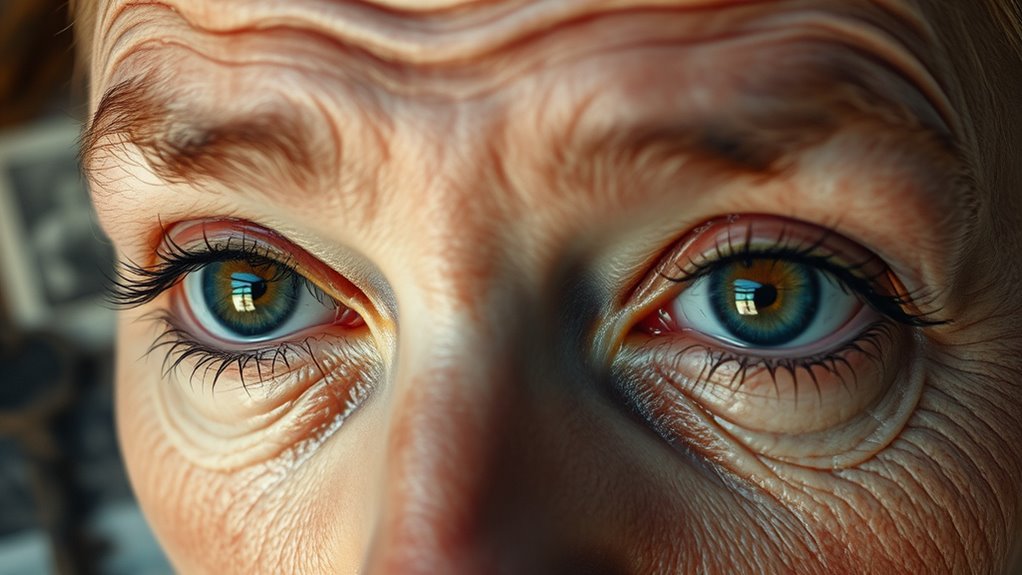Déjà vu is a fleeting, normal brain glitch that gives you a strange feeling of familiarity in new situations, caused by brief neural misfires in memory circuits like the hippocampus. In contrast, past life memories tend to be persistent, emotional experiences that often stay with you over time. If you want to understand how to differentiate normal déjà vu from deeper memories claiming past lives, there’s more to explore ahead.
Key Takeaways
- Déjà vu is a fleeting, normal memory glitch, while past life memories are often persistent and emotionally intense.
- Scientific explanations attribute déjà vu to temporary neural misfires; past life memories lack this neurological basis.
- Déjà vu occurs randomly during memory processing, whereas past life memories are usually associated with specific beliefs or experiences.
- Déjà vu is brief and harmless, unlike past life memories, which might be described as deeply personal or supernatural.
- Understanding the brain’s role helps differentiate normal déjà vu from claims of past-life recollections.

Many people experience a strange feeling of familiarity, often called déjà vu, but the origins of this sensation remain debated. You might find yourself walking through a new city or meeting someone for the first time and suddenly feeling like you’ve been there before. This phenomenon is linked to how your brain handles memory formation, and scientists have proposed several explanations to account for it. Scientific explanations suggest that déjà vu occurs when your brain’s memory processes momentarily misfire, creating a false sense of familiarity. For example, your brain might mistakenly interpret a current experience as a memory because of overlapping neural signals, leading to that uncanny feeling. These explanations highlight that déjà vu is rooted in the normal functioning of memory systems, not necessarily in anything supernatural or past-life related. High refresh rates in projectors can help reduce motion blur, making fast-paced scenes clearer and more immersive.
Déjà vu results from brief memory system glitches, not supernatural causes, rooted in normal brain processes.
Understanding the science behind déjà vu helps you recognize that it’s generally a fleeting, benign experience. Your brain constantly processes and stores new information, building a complex web of memories. Sometimes, this process isn’t perfectly synchronized, causing a brief glitch where current perceptions are mistakenly tagged as memories. This is often linked to the hippocampus, the brain region involved in consolidating memories. When this area temporarily misfires or overlaps with other neural circuits, you might experience déjà vu. Scientific research indicates that these episodes are harmless and typically happen when your brain is processing information rapidly or under stress. While some theories speculate about more profound causes, such as neurological disorders, most occurrences are simply a normal part of how your brain functions.
Frequently Asked Questions
Can Past Life Memories Be Scientifically Proven?
You might wonder if past life memories can be scientifically proven. Scientific skepticism remains because there’s limited empirical evidence to support these claims. While some studies explore the phenomenon, they often lack rigorous methodology. Without solid empirical evidence, the scientific community remains cautious. For now, past life memories aren’t definitively proven, and you should approach such claims with skepticism, understanding that more research is needed to establish any scientific basis.
Are There Specific Triggers That Cause Déjà Vu?
Many believe certain neural triggers spark déjà vu, making you feel like you’ve experienced a moment before. These triggers, like familiar sights or sounds, activate emotional responses that create a fleeting sense of familiarity. Scientific research suggests that your brain’s memory system sometimes misfires, causing these experiences. So, when you encounter specific stimuli, your brain’s neural triggers and emotional responses intertwine, producing the uncanny sensation of déjà vu.
How Can I Differentiate Between a Dream and a Past Life Memory?
When distinguishing a dream from a past life memory, pay attention to symbolism interpretation and emotional intensity. Memories often carry vivid symbolism and evoke strong emotions that linger, unlike typical dreams. Past life memories may feel more profound, with clarity and details that seem beyond ordinary dreams. Trust your feelings and look for recurring themes or symbols, which can hint at deeper, meaningful connections rather than just fleeting dream imagery.
Do Cultural Beliefs Influence Perceptions of Past Life Memories?
You might notice that cultural beliefs shape how you perceive past life memories. Cultural narratives and belief systems influence your interpretation, making some experiences seem more authentic or meaningful based on your background. If your culture emphasizes reincarnation or spiritual history, you’re more likely to interpret certain sensations as past life memories. Conversely, different cultural contexts may lead you to dismiss or reinterpret these experiences, highlighting the powerful role of cultural influences.
Is There a Way to Intentionally Recall Past Life Experiences?
You can try intentionally recalling past life experiences through guided meditation, which helps relax your mind and access deeper memories. Using memory techniques like visualization and focused affirmation can also enhance your ability to remember past lives. Consistent practice and openness are key, so find a quiet space, follow a guided meditation, and gently focus on your intention to uncover those memories. Over time, clarity may begin to emerge.
Conclusion
Understanding the difference between déjà vu and past life memories helps you recognize your experiences more clearly. Did you know that nearly 60% of people report experiencing déjà vu at least once? This shows how common these moments are, yet they often leave you wondering about their true origins. By paying attention to the details, you can better distinguish between a fleeting moment of familiarity and a genuine past life memory, deepening your curiosity about your own consciousness.










